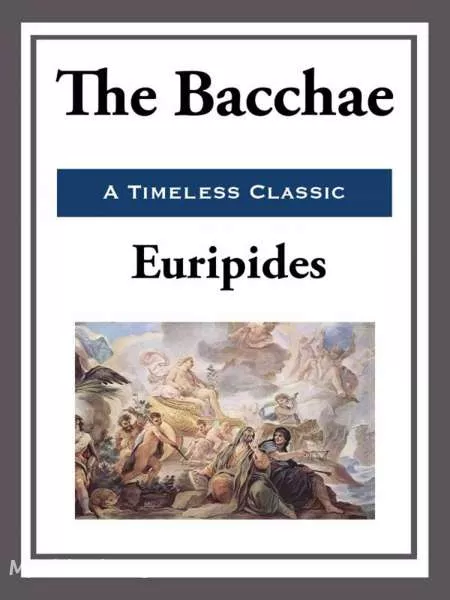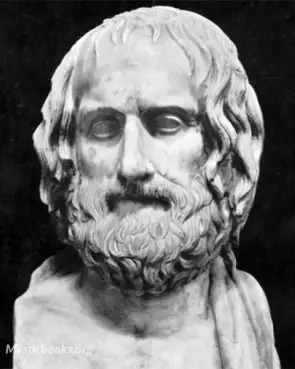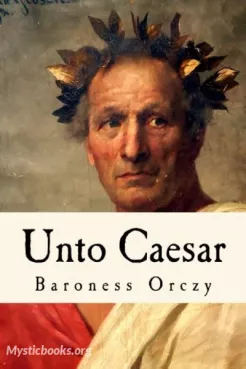
The Bacchae
by Euripides
'The Bacchae' Summary
The play begins before the palace at Thebes, with Dionysus telling the story of his birth and his reasons for visiting the city. Dionysus explains he is the son of a mortal woman, Semele, and a god, Zeus. Some in Thebes, he notes, don't believe this story. In fact, Semele's sisters—Autonoe, Agave, and Ino—claim it is a lie intended to cover up the fact that Semele became pregnant by some mortal. Dionysus reveals that he has driven the women of the city mad, including his three aunts, and has led them into the mountains to observe his ritual festivities. He has disguised himself as a mortal for the time being, but he plans to vindicate his mother by appearing before all of Thebes as a god, the son of Zeus, and establishing his permanent cult of followers.
Dionysus exits to the mountains, and the chorus (composed of the titular Bacchae) enters. They perform a choral ode in praise of Dionysus. Then Tiresias, the blind and elderly seer, appears. He calls for Cadmus, the founder and former king of Thebes. The two old men start out to join the revelry in the mountains when Cadmus’ petulant young grandson Pentheus, the current king, enters. Disgusted to find the two old men in festival dress, he scolds them and orders his soldiers to arrest anyone engaging in Dionysian worship, including the mysterious "foreigner" who has introduced this worship. Pentheus intends to have him stoned to death.
The guards soon return with Dionysus himself in tow. Pentheus questions him, both skeptical of and fascinated by the Dionysian rites. Dionysus's answers are cryptic. Infuriated, Pentheus has Dionysus taken away and chained to an angry bull in the palace stable. But the god now shows his power. He breaks free and razes the palace with an earthquake and fire. Dionysus and Pentheus are once again at odds when a herdsman arrives from the top of Mount Cithaeron, where he had been herding his grazing cattle. He reports that he found women on the mountain behaving strangely: wandering the forest, suckling animals, twining snakes in their hair, and performing miraculous feats. The herdsmen and the shepherds made a plan to capture one particular celebrant, Pentheus' mother. But when they jumped out of hiding to grab her, the Bacchae became frenzied and pursued the men. The men escaped, but their cattle were not so fortunate, as the women fell upon the animals, ripping them to shreds with their bare hands. The women carried on, plundering two villages that were further down the mountain, stealing bronze, iron and even babies. When villagers attempted to fight back, the women drove them off using only their ceremonial staffs of fennel. They then returned to the mountain top and washed up, as snakes licked them clean.
Dionysus, still in disguise, persuades Pentheus to forgo his plan to defeat and massacre the women with an armed force. He says it would be better first to spy on them, while disguised as a female Maenad to avoid detection. Dressing Pentheus in this fashion, giving him a thyrsus and fawn skins, Dionysus leads him out of the house. At this point, Pentheus seems already crazed by the god's power, as he thinks he sees two suns in the sky, and believes he now has the strength to rip up mountains with his bare hands. He has also begun to see through Dionysus' mortal disguise, perceiving horns coming out of the god's head. They exit to Cithaeron.
A messenger arrives to report that once the party reached Mount Cithaeron, Pentheus wanted to climb an evergreen tree to get a better view and the stranger used divine power to bend down the tall tree and place the king in its highest branches. Then Dionysus, revealing himself, called out to his followers and pointed out the man in the tree. This drove the Maenads wild. Led by Agave, his mother, they forced the trapped Pentheus down from the tree top, ripped off his limbs and his head, and tore his body into pieces.
After the messenger has relayed this news, Agave arrives, carrying her son's bloodied head. In her god-maddened state, she believes it is the head of a mountain lion. She proudly displays it to her father, Cadmus, and is confused when he does not delight in her trophy, but is horrified by it. Agave then calls out for Pentheus to come marvel at her feat, and nail the head above her door so she can show it to all of Thebes. But now the madness begins to wane, and Cadmus forces her to recognize that she has destroyed her own son. As the play ends, the corpse of Pentheus is reassembled as well as is possible, and the royal family is devastated and destroyed. Agave and her sisters are sent into exile, and Dionysus decrees that Cadmus and his wife Harmonia will be turned into snakes and leads a barbarian horde to plunder the cities of Hellas.
Book Details
Authors

Euripides
Greece
Euripides was a tragedian of classical Athens. Along with Aeschylus and Sophocles, he is one of the three ancient Greek tragedians for whom any plays have survived in full. Some ancient scholars attri...
Books by EuripidesDownload eBooks
Listen/Download Audiobook
Related books

Marriage of William Ashe by Mary Augusta Ward
**Marriage of William Ashe** delves into the complex dynamics of a marriage between a promising politician, William Ashe, and Kitty, a free-spirited a...

Pericles, Prince of Tyre by William Shakespeare
Pericles, Prince of Tyre is a Jacobean play written at least in part by William Shakespeare and included in modern editions of his collected works des...

Modern Monologues by Marjorie Benton Cooke
Modern Monologues is a collection of 12 monologues by Marjorie Benton Cooke, a renowned monologist, playwright, and novelist. The monologues in this c...

Wild Knight and Other Poems by Gilbert K. Chesterton
Gilbert K. Chesterton's "The Wild Knight and Other Poems" is a collection of verse exploring themes of wonder, faith, and the inherent beauty of the w...

Dandy Dick by Arthur Wing Pinero
Dandy Dick is a Victorian farce by Arthur Wing Pinero, renowned for its witty dialogue and humorous situations. It follows the antics of a group of ch...

Unto Caesar by Baroness Orczy
In ancient Rome, a young woman must choose between her love for a slave and her duty to her family. Unto Caesar is a historical romance novel by Baro...

Will and No Will or a Bone for the Lawyers by Charles Macklin
“Will and No Will” is a short play, or “afterpiece,” written by Charles Macklin. The play is a comedic exploration of the themes of inheritance, greed...

Willem Tell by Pieter Louwerse
Willem Tell is a classic tale of a Swiss hero who rebels against an oppressive Austrian governor. The story follows Willem's journey as he fights for...

Hamlet by William Shakespeare
Hamlet is commonly regarded as one of the greatest plays ever written. Drawing on Danish chronicles and the Elizabethan vogue for revenge tragedy, Sha...

Pippa Passes by Robert Browning
Pippa Passes is a verse drama by Robert Browning. It was published in 1841 as the first volume of his Bells and Pomegranates series, in a low-priced t...
Reviews for The Bacchae
No reviews posted or approved, yet...